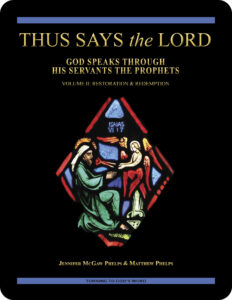 Thus Says the LORD: God Speaks
Thus Says the LORD: God Speaks
Through His Servants the Prophets
Volume II: Restoration & Redemption
Lesson 11 Zechariah’s Hopes for a Davidic King
the Book of Zechariah 1:1–17
the Book of Zechariah 2:1—3:4
the Book of Zechariah 3:6–9
the Book of Zechariah 4:1–14
the Book of Zechariah 6:9–13
the Book of Zechariah 7:8–14
the Book of Zechariah 9:9–17
the Book of Zechariah 12:10
the Book of Zechariah 13:1
the Book of Zechariah 14:8
Revised Standard Version Catholic Edition (RSVCE)*
New American Bible Revised Edition (NABRE)*
Catechism of the Catholic Church
ex libris (in our library)
glossary for Thus Says the LORD—Volume II
cross references in Thus Says the LORD—Volume II
next lesson: Ezra Combines Legal & Religious Authority
This online supplemental material coordinates with the lesson on pages 77–84 of Thus Says the LORD: God Speaks Through His Servants the Prophets—Volume II: Restoration & Redemption.
“For as the rain and the snow come down from heaven,
and return not thither but water the earth, making it bring forth and sprout,
giving seed to the sower and bread to the eater,
so shall my word be that goes forth from my mouth;
it shall not return to me empty, but it shall accomplish that which I purpose,
and prosper in the thing for which I sent it.”
—the Book of Isaiah 55:10–11 (RSVCE)**
welcome to Volume II of our in-depth study of the biblical prophets
We invite you to check out the sample first lesson and video from Volume II of this Turning to  God’s Word
God’s Word  two-part Catholic Bible study. Our online pages link to the free related lesson videos, a glossary, and cross references in the biblical text, and include maps, additional commentary, and prayers based on the primary Scripture in each lesson. Thus Says the LORD: God Speaks Through His Servants the Prophets—Volume II: Restoration & Redemption contains 23 lessons and has been granted an imprimatur. It may be purchased from our website shop. The companion 28-lesson Volume I: A Kingdom Divided also is available for purchase. If you have a Bible-study question or comment, click on the “ask us your question” or “what do you think” button on any study page.
two-part Catholic Bible study. Our online pages link to the free related lesson videos, a glossary, and cross references in the biblical text, and include maps, additional commentary, and prayers based on the primary Scripture in each lesson. Thus Says the LORD: God Speaks Through His Servants the Prophets—Volume II: Restoration & Redemption contains 23 lessons and has been granted an imprimatur. It may be purchased from our website shop. The companion 28-lesson Volume I: A Kingdom Divided also is available for purchase. If you have a Bible-study question or comment, click on the “ask us your question” or “what do you think” button on any study page.
open with prayer
It’s always wise to begin any Bible study with prayer, whether reading the Scriptures alone or meeting with others in a discussion study group. You can pray using your own words or use one of the opening prayers on our website. We especially like the following:
Lord Jesus, you promised to send your Holy Spirit
to teach us all things.
As we read and study your word today,
allow it to touch our hearts and change our lives. Amen.
let’s review—the Book of Ezra 1:1–7, the Book of Ezra 6:1–5, and the Book of Haggai 1:1—2:23
Lesson 10 The Return Gets Underway; the LORD Wants the Temple Rebuilt looks at one of the two prophets most known for being active in Jerusalem in the time immediately after the former captives were allowed to return from Babylon. Haggai’s repeated calls for the people to rebuild the Temple indicate that the descendants of Jacob originally didn’t consider this a priority, probably because the presence of Solomon’s Temple in Jerusalem had failed to prevent the overthrow of the former southern kingdom of Judah. The prophet also refers to the returning former captives as a remnant, and it’s known that a large number of the descendants of Jacob elected to remain in Babylon. There are no biblical books describing their situation there after others return to Jerusalem. Like the Exile itself, the Return occurs in several waves.
who wrote the Book of Zechariah & when?
Most scholars believe that only the first eight chapters in the Book of Zechariah can be reliably attributed to the prophet of that name who wrote in the 6th century B.C. The ninth through fourteenth chapters in the Book of Zechariah are thought to have been recorded by another person usually referred to as Deutero- (Second) Zechariah, who is believed to have been writing a couple of hundred years later during the 4th century B.C. What evidence can you point to in the Book of Zechariah that might support these scholarly suppositions?
map notes—mystery surrounds the fate of Zerubbabel
Prior to 522 B.C. when Darius the Great usurped the Persian throne, Persia’s interests were fraught with political turmoil. The prophets Haggai and Zechariah viewed this as a signn that God was about to 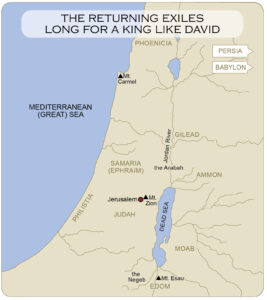 reinstate a royal Davidic dynasty in the former southern kingdom. Zechariah’s early prophecies reflect hope that this eternal dynasty would come about through the crowning of Zerubbabel, the Persian-appointed governor who also was a grandson of King Jehoiachin, a descendant of David. Jehoiachin briefly ruled Judah in 597 B.C. before being taken with his family in the first wave of the Babylonian Exile. There are no historical records of Zerubbabel ascending to the throne at the time of Zechariah (or any other time), and he completely disappears from history in 522 B.C. Scholars speculate that the Persians might have gotten wind of an uprising brewing in Judah and removed Zerubbabel as governor, possibly executing him. Click on the map (right) to enlarge it. The original map is on page 82 of Thus Says the LORD: God Speaks Through His Servants the Prophets—Volume II: Restoration & Redemption.
reinstate a royal Davidic dynasty in the former southern kingdom. Zechariah’s early prophecies reflect hope that this eternal dynasty would come about through the crowning of Zerubbabel, the Persian-appointed governor who also was a grandson of King Jehoiachin, a descendant of David. Jehoiachin briefly ruled Judah in 597 B.C. before being taken with his family in the first wave of the Babylonian Exile. There are no historical records of Zerubbabel ascending to the throne at the time of Zechariah (or any other time), and he completely disappears from history in 522 B.C. Scholars speculate that the Persians might have gotten wind of an uprising brewing in Judah and removed Zerubbabel as governor, possibly executing him. Click on the map (right) to enlarge it. The original map is on page 82 of Thus Says the LORD: God Speaks Through His Servants the Prophets—Volume II: Restoration & Redemption.
 messianic themes in the Book of Zechariah (01:06:05)
messianic themes in the Book of Zechariah (01:06:05)
In the video overview for Lesson 11, Turning to God’s Word author Matthew Phelps  anticipates some of the material in the final two lessons in Volume II: Restoration & Redemption. There are many passages in the Book of Zechariah that tie to the book of Revelation, the last book in the New Testament. Both authors rely heavily on apocalyptic themes, but while the prophet Zechariah is describing his vision in Old Testament terms, the author of the book of Revelation uses the same prophecies as a foundation for the prevailing Christian vision of heaven. One important thing to note is that the Book of
anticipates some of the material in the final two lessons in Volume II: Restoration & Redemption. There are many passages in the Book of Zechariah that tie to the book of Revelation, the last book in the New Testament. Both authors rely heavily on apocalyptic themes, but while the prophet Zechariah is describing his vision in Old Testament terms, the author of the book of Revelation uses the same prophecies as a foundation for the prevailing Christian vision of heaven. One important thing to note is that the Book of  Zechariah demonstrates how it is that a prophet can be issuing true prophecy and still not understand the message that he’s delivering. The Book of Zechariah also shows the emergence of the written word and law over oral tradition. The word of the prophet only lasts as long as the prophet is alive. Once a prophet dies, his message dies with him unless it’s been written down. This is apparent in the Book of Zechariah 1:5, in which the LORD asks Zechariah: “Your fathers, where are they? And the prophets, do they live for ever?” It was during the Exile that the descendants of Jacob began to recognize the value of written law and of recording the words of the prophets to be read by future generations.
Zechariah demonstrates how it is that a prophet can be issuing true prophecy and still not understand the message that he’s delivering. The Book of Zechariah also shows the emergence of the written word and law over oral tradition. The word of the prophet only lasts as long as the prophet is alive. Once a prophet dies, his message dies with him unless it’s been written down. This is apparent in the Book of Zechariah 1:5, in which the LORD asks Zechariah: “Your fathers, where are they? And the prophets, do they live for ever?” It was during the Exile that the descendants of Jacob began to recognize the value of written law and of recording the words of the prophets to be read by future generations.
The Scripture ranges for the videos that accompany this Catholic Bible study match the ranges for the sets of questions in Thus Says the LORD: God Speaks Through His Servants the Prophets—Volume II: Restoration & Redemption. You can follow along as Turning to God’s Word author Matthew Phelps discusses Lesson 11, “Zechariah’s Hopes for a Davidic King,” on pages 77–84 in the study book.
the Return occurs in at least three distinct waves
Most people don’t realize that when the captives are allowed to return to Jerusalem from Babylon, they do so in several waves. This happens in much the same way that they went into exile—only in reverse. Instead of the upper classes being the first to return, they end up being the last. The Book of Zechariah occurs during the second wave of the Return when Persia is being ruled by Darius. The first wave came under the reign of the Persian ruler Cyrus. Lesson 12 Ezra Combines Legal & Religious Authority will look at yet a third wave under the rule of Artaxerxes.
what are these angels doing in the Book of Zechariah?
The early chapters in the Book of Zechariah make use of a literary device that emphasizes the need for prophecy to be explained. In the Book of Zechariah 1:9, an angel is introduced to answer the prophet’s questions about Zechariah’s vision. Although revelation comes from God, it’s possible (and even likely) that it can be misunderstood—even by the prophet delivering the message.  Human beings continue to need God’s help to interpret the meaning of divine revelation. In the video for this lesson, Turning to God’s Word author Matthew Phelps stresses that this is foundational to the way in which Christians read and understand divine revelation. To get back to the time of the Old Testament: Without the angel’s explanation, Zechariah’s vision doesn’t appear to be that profound. The prophet sees a guy sitting on a horse in a grove with some other horses. The angel’s explanation elevates the vision to apocalyptic prophecy worthy of recurring in the New Testament book of Revelation 6:1–8, where the visions are so bizarre that they’re difficult to understand even with explanation. The Turning to God’s Word Catholic Bible study The Revelation of Jesus Christ: The Faithful Witness examines the final book of the New Testament, and the final two lessons in
Human beings continue to need God’s help to interpret the meaning of divine revelation. In the video for this lesson, Turning to God’s Word author Matthew Phelps stresses that this is foundational to the way in which Christians read and understand divine revelation. To get back to the time of the Old Testament: Without the angel’s explanation, Zechariah’s vision doesn’t appear to be that profound. The prophet sees a guy sitting on a horse in a grove with some other horses. The angel’s explanation elevates the vision to apocalyptic prophecy worthy of recurring in the New Testament book of Revelation 6:1–8, where the visions are so bizarre that they’re difficult to understand even with explanation. The Turning to God’s Word Catholic Bible study The Revelation of Jesus Christ: The Faithful Witness examines the final book of the New Testament, and the final two lessons in  Thus Says the LORD: God Speaks Through His Servants the Prophets—Volume II: Restoration & Redemption address the way that some of the more obvious Old Testament passages reappear in the book of Revelation.
Thus Says the LORD: God Speaks Through His Servants the Prophets—Volume II: Restoration & Redemption address the way that some of the more obvious Old Testament passages reappear in the book of Revelation.
God plans to send the ultimate messenger
The Letter to the Hebrews 1:1–2 explains what the LORD had in mind to make it easier for men and women to understand his message: “In many and various ways God spoke of old to our fathers by the prophets; but in these last days he has spoken to us by a Son, whom he appointed the heir of all  things, through whom also he created the world.” The Turning to God’s Word Catholic Bible study The Letter to the Hebrews: An Explanation of the Mechanism of Our Salvation takes a closer look at how the death of Jesus is able to bring the possibility of salvation to all humanity.
things, through whom also he created the world.” The Turning to God’s Word Catholic Bible study The Letter to the Hebrews: An Explanation of the Mechanism of Our Salvation takes a closer look at how the death of Jesus is able to bring the possibility of salvation to all humanity.
satan—you could look it up in our archives
The Book of Zechariah 3:1 introduces the idea of Satan standing ready to accuse the high priest Joshua  before the LORD. The word “satan “appears only two other places in the Old Testament—in the first two chapters in the Book of Job and in the First Book of the Chronicles 21:1. In Lost in Translation, an online column that can help readers connect with ideas expressed in the original languages of the Scriptures, Turning to God’s Word author Matthew Phelps explains that the word “satan” comes from a Hebrew word that means “adversary.” New Lost in Translation entries are posted on Mondays, and past entries are archived on our website. Contact us if you’d like to receive Lost in Translation by email every week. Consider whether knowing that the word “satan” means an adversary changes your understanding of the Gospel According to Matthew 16:23 in which Jesus says to Peter: “Get behind me, Satan! You are a hindrance to me; for you are not on the side of God, but of men.”
before the LORD. The word “satan “appears only two other places in the Old Testament—in the first two chapters in the Book of Job and in the First Book of the Chronicles 21:1. In Lost in Translation, an online column that can help readers connect with ideas expressed in the original languages of the Scriptures, Turning to God’s Word author Matthew Phelps explains that the word “satan” comes from a Hebrew word that means “adversary.” New Lost in Translation entries are posted on Mondays, and past entries are archived on our website. Contact us if you’d like to receive Lost in Translation by email every week. Consider whether knowing that the word “satan” means an adversary changes your understanding of the Gospel According to Matthew 16:23 in which Jesus says to Peter: “Get behind me, Satan! You are a hindrance to me; for you are not on the side of God, but of men.”
ex libris—more about the role of Satan
In Introduction to the Prophets: Their Stories, Sayings, and Scrolls, the author, Thomas L. Leclerc, M.S. (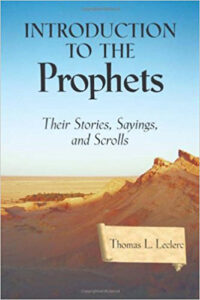 Missionaries of La Salette), a priest and professor at Emmanuel College in Boston,
Missionaries of La Salette), a priest and professor at Emmanuel College in Boston,  Massachusetts, explains that although it isn’t evident in most English translations, the oldest Old Testament manuscripts identify satan with an article, “the” satan. (Capital letters and punctuation also aren’t present on those manuscripts.) Use of the article is in keeping with the idea that the satan represents a legal adversary and isn’t a name for the devil. Leclerc explains that the satan’s function in the Book of Zechariah resembles that of a prosecuting attorney who accuses people of their transgressions against God’s law. Read excerpts and learn more about Introduction to the Prophets: Their Stories, Sayings, and Scrolls and other works related to Bible study at ex libris—main bookshelf.
Massachusetts, explains that although it isn’t evident in most English translations, the oldest Old Testament manuscripts identify satan with an article, “the” satan. (Capital letters and punctuation also aren’t present on those manuscripts.) Use of the article is in keeping with the idea that the satan represents a legal adversary and isn’t a name for the devil. Leclerc explains that the satan’s function in the Book of Zechariah resembles that of a prosecuting attorney who accuses people of their transgressions against God’s law. Read excerpts and learn more about Introduction to the Prophets: Their Stories, Sayings, and Scrolls and other works related to Bible study at ex libris—main bookshelf.
so who is this Branch?
In the third through sixth chapters in the Book of Zechariah, the prophet makes frequent reference to someone God addresses as the Branch (in some translations this is rendered as Shoot). The text is unclear whether Branch refers to the Persian-appointed governor of the region—Zerubbabel—or to the high priest—Joshua. Many scholars suggest that the prophet Zechariah is writing about the crowning of Zerubbabel, and only later—after Zerubbabel mysteriously disappears from history—did the text record that it was Joshua the high priest whose crowning is described in the Book of Zechariah 6:9–13.
a shared name
The enthronement of Joshua can be seen as a prophetic foreshadowing of the reign of Christ the King, since the name Joshua is essentially the same as the name Jesus. Jeshua is the English transliteration  of the Hebrew name Yeshua found in some translations of the Old Testament. Its English spelling is Joshua. The English spelling of the Greek transliteration (Iesous) is Jesus. Our online glossary lists all of the proper nouns in the biblical text for every lesson in Thus Says the LORD: God Speaks Through His Servants the Prophets—Volume II: Restoration & Redemption, and includes the meaning of most of those names.
of the Hebrew name Yeshua found in some translations of the Old Testament. Its English spelling is Joshua. The English spelling of the Greek transliteration (Iesous) is Jesus. Our online glossary lists all of the proper nouns in the biblical text for every lesson in Thus Says the LORD: God Speaks Through His Servants the Prophets—Volume II: Restoration & Redemption, and includes the meaning of most of those names.
a prophetic curse
The Book of Jeremiah 22:30 contains a prophetic curse, which reflects Jeremiah’s antipathy toward Jehoiachin, the youthful king who surrendered without a fight to Babylon in 597 B.C.: “Write this man down as childless, a man who shall not succeed in his days; for none of his offspring shall succeed in sitting on the throne of David, and ruling again in Judah.” Zerubbabel is Jehoiachin’s grandson, and his crowning by Zechariah would have proved Jeremiah’s prophecy to be false.
rebuilding the Temple is critical
During the Exile, the priesthood suffered because the primary purpose of the priests—to offer sacrifice in atonement for sin—could be carried out only in the presence of God at the Temple in Jerusalem. Unfortunately, the Temple was destroyed by the Babylonians in 587–586 B.C. After the Return, the former captives appeared in no hurry to rebuild the Temple, but through the prophets Haggai and Zechariah the LORD encourages them to do so. Temple worship is essential for the descendants of Jacob to survive as a religious community, and it’s important to God that such ritualized worship practices occur in tandem with renewed emphasis in the law of the covenant.
Zechariah & the rise of the priesthood
Although the prophet Zechariah seems certain that the LORD intends to restore the southern kingdom of Judah through Jehoiachin’s grandson Zerubbabel, this doesn’t actually happen. Despite Zechariah’s interest in the restoration of the Davidic monarchy, no member of the royal family ever again ascends to the throne in Judah. Zechariah also is a priest, however, which explains his keen interest in liturgy. The Book of Nehemiah 12:17 identifies Iddo as a priest whose family traveled to Jerusalem with Zerubbabel. The Book of Zechariah 1:1 opens with a description of Zechariah’s call as a prophet and identifies him as the son of Iddo, indicating the prophet was born into the line of the priesthood. Zechariah’s fascination with the high priest Joshua well may reflect his own priestly upbringing.
separation of church & state
After Zerubbabel vanishes from the scene without any clue about what might have happened to him, the high priest Joshua takes over the internal affairs of the Jews. This role of the high priest passes to his successors, but political power is left in the hands of Persian-appointed governors of the region. The Book of Zechariah reflects the prophet’s intense disappointment that Persia continues to rule over the descendants of Jacob now returned to their homeland of Judah, but the prophet also looks forward in hope to better times. A key component of that hope is the messianic promise made by the LORD to David in the Second Book of Samuel 7:12–13: “When your days are fulfilled and you lie down with your fathers, I will raise up your offspring after you, who shall come forth from your body, and I will establishhis kingdom. He shall build a house for my name, and I will establish the throne of his kingdom for ever.” You can learn more about David and the promise God made regarding one of his descendants  in Lesson 14 God’s Promise to David in the Turning to God’s Word Catholic Bible study The United Kingdom of Israel: Saul, David & Solomon Foreshadow Christ the King.
in Lesson 14 God’s Promise to David in the Turning to God’s Word Catholic Bible study The United Kingdom of Israel: Saul, David & Solomon Foreshadow Christ the King.
WHAT DO YOU THINK is meant by the phrase ‘prisoners of hope’?
In the Book of Zechariah 9:12, the LORD issues these comforting words to the descendants of Jacob: “ Return to your stronghold, O prisoners of hope; today I declare that I will restore to you double.”
Return to your stronghold, O prisoners of hope; today I declare that I will restore to you double.”
? What might Zechariah’s original audience have thought the LORD meant when he asked them to return to their stronghold?
? Consider what God’s reference to his people as “prisoners of hope” indicates about how the LORD views the descendants of Jacob.
? How can this verse be interpreted in a meaningful way by present-day Christians?
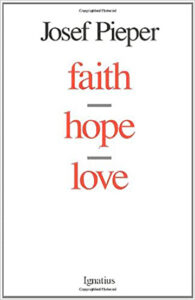 ex libris—are you interested in hope?
ex libris—are you interested in hope?
We continue to recommend Faith Hope Love by Joseph Pieper. (If you aren’t  interested, you might want to ask yourself the point of having faith.) In his book, Pieper also looks at how all three theological virtues—faith, hope, and love—are essential to Christianity. Pieper’s academic discipline is philosophy rather than theology, and he does an exceptional job focusing on language to narrow the definition of the concept of hope to bring it into sharper focus for Catholics. Read excerpts and learn more about Faith Hope Love and other works related to Bible study at ex libris—main bookshelf.
interested, you might want to ask yourself the point of having faith.) In his book, Pieper also looks at how all three theological virtues—faith, hope, and love—are essential to Christianity. Pieper’s academic discipline is philosophy rather than theology, and he does an exceptional job focusing on language to narrow the definition of the concept of hope to bring it into sharper focus for Catholics. Read excerpts and learn more about Faith Hope Love and other works related to Bible study at ex libris—main bookshelf.
a humble king is on the way
The Book of Zechariah 9:9–10 provides a description of a future humble king riding into Jerusalem in triumph. Jesus relies on the crowds in Jerusalem being familiar with this passage when he makes his entrance into the Holy City at the beginning of Holy Week, a detail recorded by all four of the New Testament Gospel writers. Of significance is the type of king described in Zechariah’s prophecy.
entrance into the Holy City at the beginning of Holy Week, a detail recorded by all four of the New Testament Gospel writers. Of significance is the type of king described in Zechariah’s prophecy.
? In addition to picking up that Jesus is both humble and triumphant, what else can be learned about from reading the passage in the Book of Zechariah?
? Consider whether the crowds greeting Jesus on Palm Sunday understood the type of kingdom Jesus had in mind.
? What counsel might help a friend or family member having trouble accepting the idea of the reign of Christ the King?
biblical vocabulary—plummet or plumb line
In the Book of Zechariah 4:10, the prophet envisions Zerubbabel holding a plummet, which sometimes is referred to as a plumb line. This is a cord with a weight attached to one end. When the cord is held so that the weight can dangle freely, an exact vertical can be determined. Painters and carpenters use plumb lines to keep their work straight. What point does Zechariah seem to be making about Zerubbabel’s role in building the foundation of the house of the LORD? Considering that mention of Zerubbabel completely disappears from history, how might Zechariah’s prophecy about a Davidic king (a Messiah or “Anointed One”) be interpreted by present-day Christians? You can learn more about the prophesied king  in Lesson 14 God’s Promise to David in the Turning to God’s Word Catholic Bible study The United Kingdom of Israel: Saul, David & Solomon Foreshadow Christ the King.
in Lesson 14 God’s Promise to David in the Turning to God’s Word Catholic Bible study The United Kingdom of Israel: Saul, David & Solomon Foreshadow Christ the King.
how is this relevant?
The Book of Zechariah 2:1–12 describes a recurring theme in apocalyptic Scripture—that of a man sent by God to measure Jerusalem or the Temple. A similar idea appeared in the Book of Ezekiel 40:1—42:20, and the theme repeats in the book of Revelation 11:1–2. Each lesson in the study book Thus Says the LORD: God Speaks Through His Servants the Prophets—Volume II: Restoration & Redemption contains commentaries designed to make it easier to reflect on ways that God’s Word applies to present-day Christians.
theme repeats in the book of Revelation 11:1–2. Each lesson in the study book Thus Says the LORD: God Speaks Through His Servants the Prophets—Volume II: Restoration & Redemption contains commentaries designed to make it easier to reflect on ways that God’s Word applies to present-day Christians.
? What might the measuring in the Old Testament Books of Zechariah and Ezekiel anticipate?
? In the book of Revelation, what is the author (John of Patmos) asked to measure?
? What do the Old Testament passages suggest might be about to happen in the book of Revelation?
? How might present-day Christians interpret these passages in a meaningful way?
? How might the measuring line be interpreted that the prophet, in the Book of Zechariah 1:16, says the LORD is going to stretch out across all of Jerusalem?
? What has replaced the physical Temple in Jerusalem?
? Consider the ways in which God might measure this new Temple and what purpose he would have for doing that.
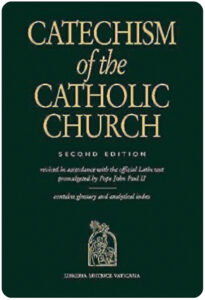 the best Catholic commentary about Scripture
the best Catholic commentary about Scripture
To find out more about how Church teaching is supported by Scripture passages in Thus Says the LORD: God Speaks Through His Servants the Prophets—Volume II: Restoration & Redemption, check out the Index of Citations in the Catechism of the Catholic Church. Links (Revised Standard Version Catholic Edition [RSVCE*]) to the primary Scripture passages in the lesson and relevant paragraphs in the Catechism are provided here. Not every passage in the biblical text for this Catholic Bible study is referenced in a Catechism paragraph, however, including the following passages from this lesson: the Book of Zechariah 3:6–9 and the Book of Zechariah 7:8–14.
the Book of Zechariah 1:12—paragraph 336
the Book of Zechariah 2:10—paragraph 722
the Book of Zechariah 2:13—paragraph 2143
the Book of Zechariah 4:14—paragraph 436
the Book of Zechariah 6:13—paragraph 436
the Book of Zechariah 9:9—paragraph 559
the Book of Zechariah 12:10—paragraphs 1432, 2561
the Book of Zechariah 13:1—paragraph 2561
the Book of Zechariah 14:8—paragraph 694
ways our glossary might prove helpful
In addition to providing extra information about geographical locations, our glossary also points out  persons and places mentioned in the biblical text under multiple names or spellings. If you can remember a name but aren’t sure in which lesson it shows up, you can find it in the glossary, which lists every proper noun that appears in the primary biblical text for Thus Says the LORD: God Speaks Through His Servants the Prophets—Volume II: Restoration & Redemption.
persons and places mentioned in the biblical text under multiple names or spellings. If you can remember a name but aren’t sure in which lesson it shows up, you can find it in the glossary, which lists every proper noun that appears in the primary biblical text for Thus Says the LORD: God Speaks Through His Servants the Prophets—Volume II: Restoration & Redemption.
to learn more, read more Scripture
It can help to check out the cross references listed in Scripture, but looking them up is time-consuming. To make that part easier, we’ve  compiled the cross references from the Revised Standard Version Second Catholic Edition (RSV2CE)—the translation that we reprint in our study books. That list can be found at the top of every online study page accompanying this study, and it includes links to each of the cross references in the primary biblical text for Thus Says the LORD: God Speaks Through His Servants the Prophets—Volume II: Restoration & Redemption.
compiled the cross references from the Revised Standard Version Second Catholic Edition (RSV2CE)—the translation that we reprint in our study books. That list can be found at the top of every online study page accompanying this study, and it includes links to each of the cross references in the primary biblical text for Thus Says the LORD: God Speaks Through His Servants the Prophets—Volume II: Restoration & Redemption.
don’t forget about our indexes & extra online material

 If you’re trying to locate information about a specific Scripture passage, you can look it up in the index at the back of the study book or sample lesson. If you want to find a particular commentary, you can look up its title in the topics index. To learn more about another book of the Bible for which there’s a Turning to God’s Word study, visit the online study directories to read the commentaries and watch any accompanying videos. Finally, if you have a question or would like to make a comment about any of our studies, you can use one of the “ask us your question” or “what do you think” buttons to email our authors.
If you’re trying to locate information about a specific Scripture passage, you can look it up in the index at the back of the study book or sample lesson. If you want to find a particular commentary, you can look up its title in the topics index. To learn more about another book of the Bible for which there’s a Turning to God’s Word study, visit the online study directories to read the commentaries and watch any accompanying videos. Finally, if you have a question or would like to make a comment about any of our studies, you can use one of the “ask us your question” or “what do you think” buttons to email our authors.
ex libris—Church documents & books about religious topics
Link to magisterial documents referred to in our Bible studies at ex libris—magisterial documents.  This listing includes significant recent encyclicals as well as a number of historical Church documents. Recommended books related to Scripture study can be found at ex libris—main bookshelf.
This listing includes significant recent encyclicals as well as a number of historical Church documents. Recommended books related to Scripture study can be found at ex libris—main bookshelf.
wondering how to pronounce some of these words?
The following links are to readings from the New International Version (NIV) Bible. To listen, open one of the links and click on the audio icon above the printed text. Although not taken from the translations used in our study materials, the NIV readings provide an audio guide to pronunciation of words in this lesson’s primary biblical texts. A close online version of the translation of the Bible used in Catholic liturgy in the United States as well as an audio guide for daily Mass readings for the current month can be found on the website of the United States Conference of Catholic Bishops (USCCB).
the Book of Zechariah 1:1–17 (NIV)
the Book of Zechariah 2:1—3:4 (NIV)
the Book of Zechariah 3:6–9 (NIV)
the Book of Zechariah 4:1–14 (NIV)
the Book of Zechariah 6:9–13 (NIV)
the Book of Zechariah 7:8–14 (NIV)
the Book of Zechariah 9:9–17 (NIV)
the Book of Zechariah 12:10 (NIV)
the Book of Zechariah 13:1 (NIV)
the Book of Zechariah 14:8 (NIV)
 close with Bible-based prayer related to this lesson
close with Bible-based prayer related to this lesson
Many of our Catholic study groups like to conclude their discussions with a prayer based on the scriptural focus of their lesson, and some participants include Scripture-specific prayer in their individual study. If you’re uncomfortable composing your own Bible-based prayers you can follow our four easy steps, or you can use the following prayer based on this lesson’s biblical texts.
Lord of hosts, you sent your law and words through the prophets
to call your people to return to you so you could return to them.
Hear our prayers of repentance
as you hear the prayers of the angels who are in your presence.
We pray this in the name of your Son, Jesus Christ,
whom you sent into the world to offer forgiveness,
peace, and an outpouring of your Holy Spirit. Amen.
Lesson 12 Ezra Combines Legal & Religious Authority—the Book of Ezra 7:1–26, the Book of Nehemiah 8:1–3, the Book of Nehemiah 8:6, the Book of Nehemiah 8:13–17, the Book of Ezra 9:1–3, the Book of Ezra 9:5–6, the Book of Ezra 9:13–15, the Book of Ezra 10:1–5, the Book of Nehemiah 4:7–9, the Book of Nehemiah 4:15–18a, and the Book of Nehemiah 6:15–16
Lesson 10 The Return Gets Underway; the LORD Wants the Temple Rebuilt—the Book of Ezra 1:1–7, the Book of Ezra 6:1–5, and the Book of Haggai 1:1—2:23
you also may like our free Lenten study of Jesus’ Passion (digital only)
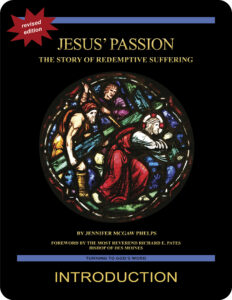 Jesus’ Passion: The Story of Redemptive Suffering is a five-lesson Catholic Bible study offering an in-depth look at the biblical foundations of the movie The Passion of the Christ. This revised study, which has been granted an imprimatur, contains all of the original material of the 2004 edition as well as many new features in an improved, reader-friendly format. Click on the book’s cover to view the introduction. Free digital lessons of Jesus’ Passion: The Story of Redemptive Suffering are available on the website during Lent.
Jesus’ Passion: The Story of Redemptive Suffering is a five-lesson Catholic Bible study offering an in-depth look at the biblical foundations of the movie The Passion of the Christ. This revised study, which has been granted an imprimatur, contains all of the original material of the 2004 edition as well as many new features in an improved, reader-friendly format. Click on the book’s cover to view the introduction. Free digital lessons of Jesus’ Passion: The Story of Redemptive Suffering are available on the website during Lent.
start a Turning to God’s Word Bible study
Thank you for your interest in Thus Says the LORD: God Speaks Through His Servants the Prophets—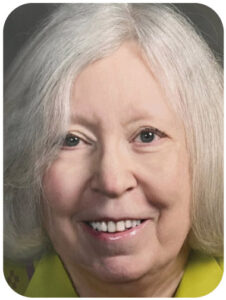 Volume II: Restoration & Redemption. You can find information
Volume II: Restoration & Redemption. You can find information  on this website about beginning a Turning to God’s Word Bible study at start a Bible study. Tami, Matthew, and I are available to answer your questions and address any of your concerns. Contact us if you’d like to start one of our studies or have your schedule listed with other TtGW study groups on our website. —Jennifer
on this website about beginning a Turning to God’s Word Bible study at start a Bible study. Tami, Matthew, and I are available to answer your questions and address any of your concerns. Contact us if you’d like to start one of our studies or have your schedule listed with other TtGW study groups on our website. —Jennifer
*There are seven deuterocanonical books in the Old Testament—the Books of Tobit, Judith, Wisdom, Sirach, Baruch, and First and Second Maccabees, as well as some passages in the Books of Esther and Daniel. Protestants usually refer to these works as “apocryphal,” a word that means “outside the (Protestant) canon” because they’re excluded from most Protestant Bibles. The word “deuterocanonical” means “second canon”; Catholics use that word to refer to any section of the Catholic Old Testament for which there are no extant, or existing, Hebrew manuscripts. All of the deuterocanonical books appear in the Septuagint, the earliest remaining versions of which date to the 1st century B.C. This Greek translation of the Old Testament was in common use by Jews at the time of Jesus—but the same books aren’t found in existing Hebrew manuscripts, which aren’t as old as the oldest version of the Septuagint. Learn more by reading How Do Catholic & Protestant Bibles Differ?
Turning to God’s Word printed Bible studies use the 2006 Revised Standard Version Second Catholic Edition (RSV2CE) translation for all Scripture references except those to the Psalms, which are taken from The Abbey Psalms and Canticles, prepared by the Benedictine monks of Conception Abbey and published in 2020 by the United States Conference of Catholic Bishops (USCCB). All Scripture links for the online study pages of Thus Says the LORD: God Speaks Through His Servants the Prophets—Volume II: Restoration & Redemption are to the 1966 Revised Standard Version Catholic Edition (RSVCE) translation. The New International Version (NIV) audio recordings follow the same chapter and verse numbering as the RSV Catholic translations, but the NIV translation doesn’t include the deuterocanonical books and passages.
The 1966 RSVCE uses archaic pronouns and verb forms such as “thee,” “thou,” “didst” in the Psalms and in direct quotations attributed to God. The 2006 RSV2CE replaces those with more accessible English. A handful of more significant translation changes in the RSV2CE include rendering almah as “virgin” in the Book of Isaiah 7:14 and restoring the term “begotten” in the Gospel According to John 3:16.
Numbering varies for some passages in this Bible study. Turning to God’s Word studies follow the numbering in the Revised Standard Version Catholic translations (RSVCE and RSV2CE). Discrepancies in the New American Bible Revised Edition (NABRE) are noted in the Index of Scripture Citations in the study book and the online sample.
 You can learn more about the Psalms by viewing a sample lesson from the Turning to God’s Word Catholic Bible study Sing a New Psalm: Communicating with God Through the Prayers of the Church—Volume I: Lauds & Vespers. The second part of that study, Sing a New Psalm: Communicating with God Through the Prayers of the Church—Volume II: Vigils, Day Prayer & Compline, is scheduled for publication in 2025. Some verse numbers may vary in different translations of the Psalms.
You can learn more about the Psalms by viewing a sample lesson from the Turning to God’s Word Catholic Bible study Sing a New Psalm: Communicating with God Through the Prayers of the Church—Volume I: Lauds & Vespers. The second part of that study, Sing a New Psalm: Communicating with God Through the Prayers of the Church—Volume II: Vigils, Day Prayer & Compline, is scheduled for publication in 2025. Some verse numbers may vary in different translations of the Psalms.
**The Book of Isaiah 55:10-11 (RSV2CE) reads: “For as the rain and the snow come down from heaven,
and do not return there but water the earth, making it bring forth and sprout, giving seed to the sower and bread to the eater, so shall my word be that goes forth from my mouth; it shall not return to me empty, but it shall accomplish that which I intend, and prosper in the thing for which I sent it.”
